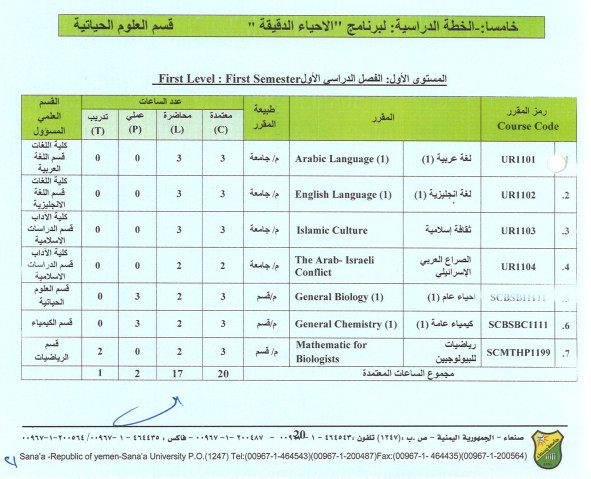Preparing graduates to work in various fields of microbiology by providing them with theoretical knowledge and appropriate scientific skills.
1. Provide the graduate with the necessary knowledge in basic and Applied Microbiology.
2. Enable the graduate with the professional and practical skills required in various microbiology laboratories (agricultural-industrial-medical-environmental)
3. Develop research skills to create microbiologists in various fields of microbiology.
4. Developing the graduate's ability to solve environmental problems.
. 1characterizes the basic knowledge in the field of microbiology and its relationship with the environmental environment.
.2differs between different concepts related to pure and Applied Microbiology.
.3. analyzes and interprets statistical data related to microbiology.
.4designs and evaluates scientific information to solve problems related to various applications of microbiology.
.5 isolates and identifies different types of microorganisms isolated from different sources. .
6. Diagnoses various microbes that cause human, animal and plant diseases using laboratory techniques
Standard.
7. Providing the graduate with the required ethics and vital safety standards and maintaining scientific integrity.
The graduate should be able to:
Knowledge and understanding:
A1. It describes the structural, physiological, environmental and molecular characteristics of microorganisms.
A2. It shows the nature of viruses, bacteria, fungi, algae and parasites and their basic characteristics used in the classification.
A3. Distinguish the differences between microorganisms.
A4. Explains the relationship between different microbiota and their ecosystems.
Mental skills:
B1. It connects various concepts of basic and Applied Microbiology and other sciences.
B2. It demonstrates the various methods of taxonomy, diagnosis, treatment and control of various microbial diseases.
B3. Analyzes and interprets statistical data relevant to microbiology.
B4. He describes the problems and suggests solving them.
B5. Evaluates hypotheses, experimental data, logical discussions.
Professional and practical skills:
C1. Isolates and identifies different types of microorganisms (viruses - bacteria --fungi – algae and parasites)
C2. It diagnoses microbes that cause various microbial diseases.
C3. It extracts some microbial products from microorganisms of interest in the pharmaceutical, agricultural and industrial fields.
C4. Applies appropriate safety procedures accompanying various microbial and methodological techniques.
C5. Selects the appropriate techniques for organizing and analyzing laboratory results for the preparation and submission of reports and scientific papers.
C6. It preserves microorganisms for a long time in a pure form using various methods.
Transferable skills:
D1: manages knowledge and self-learning strategies.
D2. Uses effective negotiation and communication skills as well as technology.
D3. He is fluent in time management, problem solving and decision making skills.
D4. Values the social and ethical contexts related to specialization.
D5. Employs knowledge in microbiology to solve related problems.





